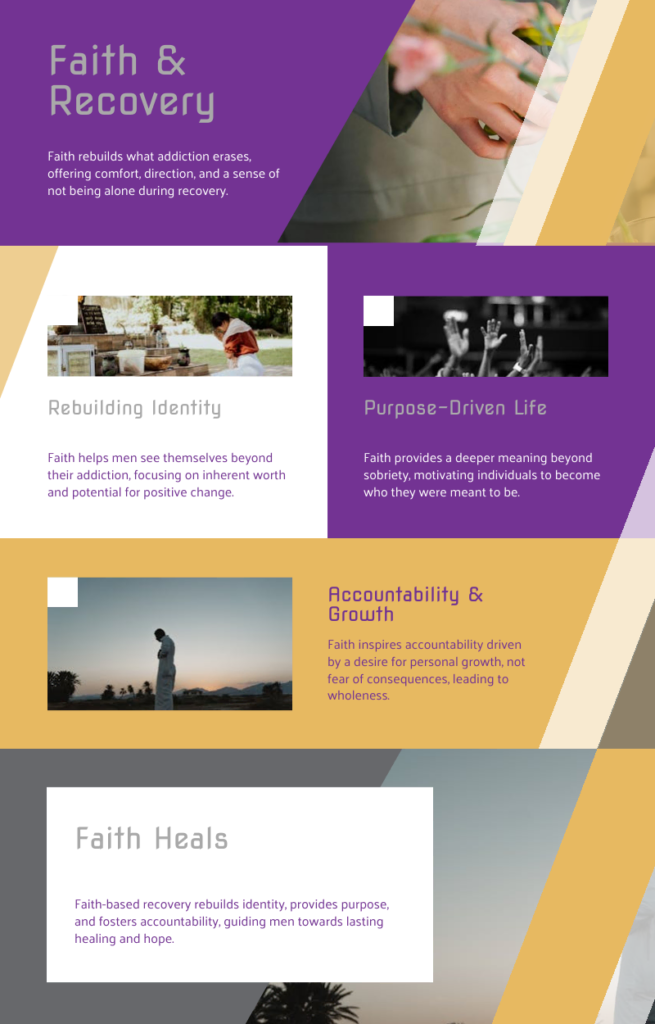Recovery isn’t one-size-fits-all, and it shouldn’t be. For some, healing means more than just getting sober. It’s about reclaiming the parts of themselves that addiction tried to erase: identity, purpose, connection. That’s where faith becomes more than a belief—it becomes an anchor.
Faith-based addiction recovery programs exist to support the whole person—body, mind, and spirit. They offer a path for those who want to grow spiritually while also doing the deep emotional work that recovery requires.
Whether someone is returning to a faith they’ve drifted from or exploring it for the first time, spiritual recovery brings a sense of comfort, meaning, and hope that clinical treatment alone may not provide.
At Firm Foundation, we don’t treat faith like an optional add-on. We treat it as the heart of the process because we’ve seen how it fuels transformation, builds resilience, and gives men a reason to keep going, even when the road is hard.
For many, it’s the missing piece that makes recovery not just possible, but personal.
What Are Faith-Based Addiction Recovery Programs?
Faith-based addiction recovery programs are treatment approaches that incorporate religious or spiritual principles into traditional addiction therapy. At their core, these programs recognize that healing is not just physical or psychological—it’s also deeply spiritual.
Participants in these programs often engage in practices such as daily prayer or meditation, scripture study, and pastoral or spiritual counseling.
Many programs, like ours at Firm Foundation, also offer discipleship or mentorship rooted in shared values and belief systems. The goal is to support clients as they reconnect with their higher power, rebuild inner strength, and develop a renewed sense of purpose.
While many programs are Christian-based, faith-based recovery can also align with other spiritual or religious traditions. What they all have in common is the integration of clinical tools—like group therapy, trauma-informed care, or dual diagnosis support—with a spiritual framework that honors the whole person.

How Faith Supports Healing in Addiction Recovery
Addiction doesn’t just take a toll on the body—it leaves deep emotional scars. Shame, isolation, and a loss of identity are common in the wake of substance use.
For many, faith becomes a means of starting to put the pieces back together. Faith-based recovery isn’t just about breaking a habit—it’s about rebuilding the parts of yourself that addiction tried to erase.
When someone reconnects with a higher power, it brings a sense of comfort and direction that’s often been missing. That spiritual connection reminds them that they’re not alone and that they’re not beyond redemption.
In this kind of healing environment, men begin to develop accountability not out of fear, but out of a desire to grow into who they were meant to be. Recovery becomes more than sobriety—it becomes a return to wholeness, hope, and purpose.
Rebuilding Identity Through Faith
Addiction has a way of rewriting how people see themselves. Over time, the damage extends beyond the substance—it chips away at self-worth, leaving behind guilt, shame, and the belief that change is impossible.
In a faith-based recovery setting, men are reminded that they’re not defined by their lowest moments.
Through prayer, reflection, and scripture, they begin to reconnect with who they truly are, not who addiction told them they were. Instead of carrying the weight of failure, they start to see themselves as loved, valued, and redeemable.
This shift doesn’t happen overnight, but as men internalize the truth that they’re more than their past, something powerful happens: they begin to believe in their own healing. With that belief comes the foundation for a new identity—one built on grace, not guilt, and on hope, not shame.
Purpose-Driven Recovery
Recovery is hard work, and staying motivated over time requires more than just external rewards. Faith provides something deeper: a sense of purpose.
For many in faith-based addiction recovery programs, spiritual beliefs offer meaning that goes beyond achieving sobriety. Recovery becomes not just about avoiding relapse, but about becoming the person they were created to be.
Whether it’s reconnecting with family, serving others, or walking more closely with God, faith offers long-term motivation that helps carry people through the inevitable ups and downs of recovery.
At Firm Foundation, we’ve seen how purpose can change everything. When a man knows why he’s fighting for his life, he’s far more likely to win that battle.
What to Expect in a Faith-Based Program Like Ours
At Firm Foundation, how you start your day matters, especially in the recovery process. That’s why each morning begins with prayer and meditation, giving our clients a moment to breathe, reflect, and reconnect with what truly matters before diving into the work of healing. It’s more than a routine—it’s a reset.
We also offer one-on-one spiritual mentorship and guided discipleship, creating a space for men to explore their faith in a personal and meaningful way.
Our clinical care is trauma-informed and Christ-centered, blending the best of both worlds. In our Partial Hospitalization Program (PHP), a typical day includes:
- Psychodynamic group sessions, where men can share openly and process life experiences
- Psychoeducation groups that focus on relapse prevention, emotional regulation, and family dynamics
- Reflection groups to help clients check in with themselves spiritually and emotionally before they leave for the day
We also offer advanced tools, such as EMDR, for trauma recovery and follow the Hazelden model for educational programming, ensuring that clients receive both spiritually grounded and evidence-based care.
Just as important is the sense of brotherhood that forms here. In our men-only environment, clients develop deep, authentic relationships founded on trust, shared values, and mutual accountability.
We also understand that recovery doesn’t end after discharge. That’s why we provide aftercare planning, dual diagnosis support, and access to our nonprofit treatment fund, helping men continue their journey long after they leave our doors.
At Firm Foundation, we’re not just focused on getting you through the program—we’re committed to walking with you for the long haul.
Who Is a Good Fit for Faith-Based Recovery?
Faith-based addiction recovery programs aren’t just for those who grew up in the church—they’re for anyone who feels called to rebuild their life through spiritual growth and transformation.
You might be a good fit for this kind of program if:
- You’re seeking a deeper spiritual connection as part of your healing
- You want to grow in your relationship with Christ while working through addiction.
- You were raised in a religious tradition and feel drawn back to it.
- You’re new to faith, but curious about how it could support your recovery.
- You’re looking for a space that fosters honesty, accountability, and fellowship.
Faith Can Be a Foundation for Healing
Choosing recovery is among the most courageous decisions you can make. For many men, bringing faith into that journey is what makes the healing process not just possible, but meaningful.
You don’t have to choose between science and spirituality.
At Firm Foundation, both have a place in the recovery process. Our Christ-centered program is rooted in compassion, clinical excellence, and the belief that no one is too far gone to be restored.
If you feel drawn to a program that supports your faith while offering proven, trauma-informed care, we’re here to help. Reach out today to discover how our approach can help you take the next step toward healing and transformation.
Frequently Asked Questions About Faith-Based Addiction Recovery
Choosing the right path for recovery is a deeply personal decision, and it’s natural to have questions, especially when considering something as unique as a faith-based addiction recovery program. Below, we’ve answered some of the most common questions we hear from men exploring this type of treatment.
Do faith-based addiction recovery programs use therapy or just prayer?
Faith-based addiction recovery programs are not limited to prayer and spiritual practices—they also incorporate clinical therapies that are proven to support long-term recovery. At Firm Foundation, for example, we combine daily spiritual practices like prayer and meditation with evidence-based therapies, including:
Trauma-informed group therapy
Individual counseling
EMDR (Eye Movement Desensitization and Reprocessing)
Psychoeducation based on the Hazelden model
The spiritual component enhances—not replaces—the therapeutic work. This approach allows clients to address the emotional, mental, and spiritual aspects of addiction in a way that feels deeply personal and transformative.
Can I join a faith-based program even if I’m not a religious person?
Absolutely. While faith-based addiction recovery programs are rooted in spiritual principles, you don’t have to identify with a specific religion to benefit from them. Many clients come to us feeling disconnected from their faith or unsure about what they believe. That’s okay.
At Firm Foundation, we meet men where they are. Whether you’re exploring spirituality for the first time or returning to beliefs you once held, our goal is to provide a welcoming, non-judgmental space. We focus on helping you grow—personally, spiritually, and emotionally—regardless of your religious background.
Are faith based addiction recovery programs effective?
Absolutely. While every recovery journey is unique, research and real-life experience indicate that incorporating faith into treatment can make a profound difference. Men who connect with a spiritual foundation during recovery often report greater motivation, stronger resilience, and a deeper sense of purpose—all of which support long-term sobriety.
Faith gives people more than just a reason to quit—it gives them something to live for. That sense of connection to a higher power can help shift the focus from guilt and shame to growth, grace, and a deeper understanding of meaning. When someone believes they’re not alone in their struggle—and that they’re still worthy of healing—it changes everything.
What’s the difference between faith-based and 12-Step programs?
While faith-based recovery programs and 12-Step programs both emphasize spirituality, there are some key differences.
Twelve-step programs (like Alcoholics Anonymous) encourage belief in a higher power but don’t define what that means. The structure is built around 12 guiding principles, and peers typically lead meetings.
Faith-based recovery programs, on the other hand, are more directly rooted in religious teachings and often offer structured spiritual mentorship. At Firm Foundation, we integrate Christian discipleship, daily prayer, and scripture study alongside clinical care—something that may go beyond the spiritual flexibility of a 12-Step group.
That said, the two can work together. Many of our clients participate in both, finding value in each approach.
Does insurance cover faith-based rehab programs?
In many cases, yes. Most insurance providers cover addiction treatment based on the level of care provided, rather than whether a program is faith-based. If a program like Firm Foundation meets clinical criteria for Partial Hospitalization (PHP), Intensive Outpatient (IOP), or Outpatient (OP) care, it can often be covered just like any other licensed treatment program.
We accept most health insurance plans and assist with insurance verification to simplify the process. If cost is a concern, we also offer support through our nonprofit organization, the Firm Foundation Treatment Fund, which provides housing and treatment scholarships to those in need.






